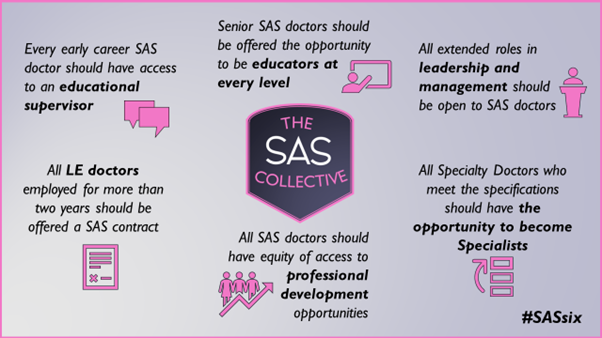Chapter 11 – Introducing the “SAS six”
By: Dr Rob Fleming
A wealth of insightful work has been produced on SAS and locally-employed doctors, highlighting our careers and the potential they offer. Royal Colleges, both individually and through the Academy of Medical Royal Colleges, have published influential reports and papers that provide essential standards. Trade unions, NHS Employers, and national membership organisations, including our Association, have also played a key role in shaping policy and advocating strongly for meaningful change. Earlier versions of this handbook contribute to this growing library of resources, many of which are referenced in other chapters and listed in the appendix below.
However, there is also a recognition from many of us working in roles representing SAS and locally-employed doctors, that the impact of this work has not been all we might have wished. The difference between this rhetoric, and reality, has proven difficult to narrow, and leads to many doctors having frustrating careers, where their potential is not realised. This costs them, the services they work within, and the patients that they care for. If everyone has the opportunity to be all they can be, everybody wins.
With this in mind, several doctors with experience representing the SAS and locally-employed workforce locally, regionally and/or nationally, came together to form the ‘SAS Collective'. This informal group established itself with the goal of improving careers and thus retention of doctors working in the UK. The SAS Collective includes doctors working in multiple specialties, and includes current and former members of the SAS committees of both the Association and Royal College of Anaesthetists.
The SAS Collective has created, and then promoted, a national campaign called the ’SAS six’. This is focussed around the right contract for the work done, support for doctors to progress their careers, and the opportunity for more experienced doctors to also become leaders and educators. None of these ideas are new, but by presenting them in a simple and memorable way, we hope that they might be more likely to be implemented.
The SAS six policy calls are:
- Every early career SAS doctor should have access to an educational supervisor
- All SAS doctors should have equity of access to professional development opportunities relevant to their stage of career
- All specialty doctors who meet the required capabilities should have the opportunity to become specialists
- More experienced SAS doctors should be offered the opportunity to be educators at every level on a par with consultants e.g. educational supervisors, clinical supervisors, directors of medical education
- All extended roles in leadership and management should be open to all substantive medical staff that is, consultants and appropriately experienced SAS doctors
- All locally-employed doctors employed for more than two years within one NHS employer should be offered the opportunity to transfer to the appropriate SAS contract.
The SAS Collective has worked extensively with national stakeholders to embed some of these concepts into national conversations about workforce and postgraduate careers. The SAS six has now been supported or endorsed by multiple national organisations, including the Association of Anaesthetists, the Intensive Care Society, HCSA, Medical Protection, the Royal College of Anaesthetists, the Royal College of Physicians, Royal College of Paediatrics and Child Health, Medical Education Leaders UK, the Medical Women's Federation, the GMC and Northumbria Helthcare NHS Foundation Trust.
More importantly perhaps, multiple trusts have now announced their intention to implement the SAS six, thereby using them as a roadmap to bring reality closer to the rhetoric. The first to do so were Northumbria Healthcare NHS Foundation Trust, in August 2024.
Any organisation who wishes to adopt the SAS six, and join the campaign, is welcome to do so. The SAS Collective believe that such an announcement represents an organisation is seeking to meaningfully invest in their LEDs and SAS doctors. The SAS Collective, and the Association are happy to work with you to make this happen. Together, we believe positive change is possible.

Appendix 1 – Further reading